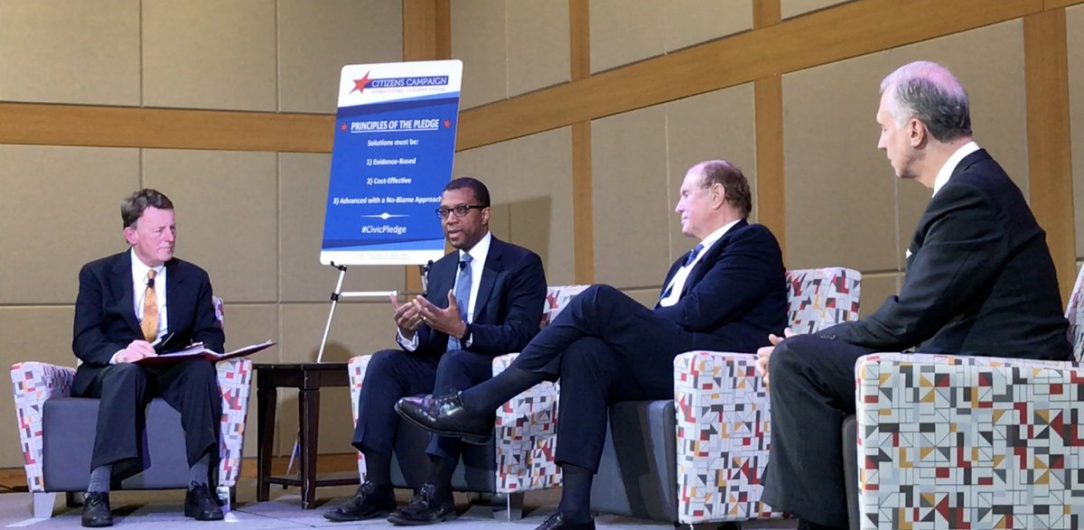
The Civic Pledge: Moving Beyond Politics, Civics Is Also Character Education
The Citizens Campaign is a non-profit that empowers citizens to be civic leaders in their community. One part of their programming is the civic trust – a group of community members who regularly meet to discuss issues facing their community and craft solutions to present to the appropriate stakeholders.
Prior to joining the civic trust, each trustee must make a pledge:
I pledge to leave my community and country better than I found them by pursuing practical solutions instead of just pointing out problems and assigning blame.
I took the pledge a couple of years ago when I served as a founding member of the Newark Civic Trust. It’s not just a good idea for adults who want to get engaged in the political process, it’s a great lesson for students who are learning about it as well.
Moving Beyond Politics Into Problem Solving
Part of civics is the nuts and bolts of politics. But another important part is teaching attitudes necessary for healthy and productive engagement in the civic process.
It’s unfortunate that everything about the process has been politicized. Chalk that up to what you will – the spotlight of the 24 hour news cycle, the intensifying echo chamber of social media, the polarization of districts through gerrymandering.
Regardless of the cause, the consequence is that every action a politician takes occurs in the context of a campaign. President Trump brings political advisors into the National Security Council. Senator Booker opposes his old allies in the school choice movement. Republicans say nothing but “No” to President Obama, and then Democrats say nothing but “No” to President Trump.
And poor Representative Josh Gottheimer tries to craft some kind of bipartisan solution for healthcare and he’s lambasted for working with Republicans.
Now don’t get me wrong. I’m a highly partisan person and in a campaign I’ll sharpen my sword and fight with the best of them. But we can’t do that every day.
That isn’t an environment in which anything substantive gets done.
The Difference Between Government and Politics
One of the essential ideas that I always emphasize in AP Government and Politics is the difference between government and politics.
Politics is the struggle for power. It’s inherently combative. There are winners and there are losers. You have to fight to win and stake out your claim to victory – which means emphasizing your differences with your opponent, highlighting their weaknesses, and spotlighting your strengths.
Government is the process for creating policy. It’s about getting things done. It’s bureaucrats in offices drafting regulations and enforcing them. It’s not pretty or glamorous, but it is far more important than politics.
Neither one can exist without the other. A political campaign needs to offer some element of policy, at least at an aspirational level. You can’t govern without engaging in some level of bureaucratic and partisan politics to ensure support for your policies.
There is a tension between the two, and in a healthy democratic society there is some semblance of balance. Right now, it’d be pretty safe to say that we’re out of balance.
The Civic Pledge and Character Education as Civics Education
This is where the civic pledge comes in. The Citizens Campaign aims to transform the way we govern from the ground up. Instead of focusing on the national level – where all of the political elements are amplified manyfold – they focus on engaging people in the local process in a level-headed, non-partisan way.
You could be a part of this by joining a civic trust if you live or work in Newark, Perth Amboy, or Trenton.
You could also take the civic pledge yourself and accept the civic challenge. You can bring this ethic to your own local community, to your local school district, or to your local association. For me, this means adhering to the principles of the pledge in my role as a leader within the NJEA and approaching things in a solution-oriented way.
But you can also bring these ideas into your classroom.
In a way, the civic pledge is a form of character education. It aims to transform the way that we interact with other people. It encourages us to participate in civil society in a civil way.
Learning the nuts and bolts of civics are important. You need to know how the process works. But knowledge of the process can elevate a monster as easily as it can elevate a hero. One doesn’t need an exceedingly deep knowledge of history to recall examples of tyrants and dictators coming to power through some sort of democratic process.
You also need to learn the attitudes necessary for civil discussion and deliberation. You need to internalize the values of a free, peace-loving democratic society. And you need to know how to separate government from politics in order to get things done.
So this year, find a way to incorporate the civic pledge in your classroom. Help your kids leave their community better than they found it.